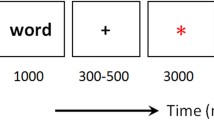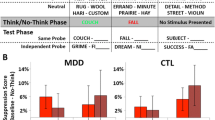Abstract
In three experiments we attempted to extend the cognitive-effort account of depressive deficits in memory to naturally depressed college students. This account maintains that depression reduces attentional resources, thereby impairing performance on demanding tasks, and has received support through experimental inductions of depressed moods. Nondepressed, naturally depressed, and (in Experiment 2) experimentally depressed college students performed unannounced tests of free recall following learning tasks with two levels of difficulty and (in Experiment 2) two degrees of structure. In Experiments 1 and 2 we measured cognitive effort on those tasks via latencies on a secondary task. Latencies and subsequent recall increased with the structure and difficulty of the learning task for nondepressed and naturally depressed subjects, but these effects were reduced or absent for experimentally depressed subjects. When the secondary task was omitted (Experiment 3), naturally depressed students still recalled without a deficit. We discuss possible differences associated with the two types of depression and implications for the cognitive-effort account.
Similar content being viewed by others
References
Beck, A. T., Ward, C., Mendelson, M., Mock, J., L Erbaugh, J. (1961). An inventory for measuring depression.Archives of General Psychiatry, 4 561–571.
Blaney, P. H. (1986). Affect and memory: A review.Psychological Bulletin, 99 229–246.
Deardorff, W. W., & Funabiki, D. (1985). A diagnostic caution in screening for depressed college students.Cognitive Therapy and Research, 9 277–284.
Dunbar, G. C., & Lishman, W. A. (1984). Depression, recognition-memory and hedonic tone: A signal detection analysis.British Journal of Psychiatry, 144 376–382.
Ellis, H. C., & Ashbrook, P. W. (1988). Resource allocation model of the effects of depressed mood states on memory. In Fiedler, K., & Forgus, J. (Eds.)Affect, cognition, and social behavior (pp. 25–43). Toronto: Hogrefe.
Ellis, H. C., Thomas, R. L., McFarland, A. D., & Lane, W. (1985). Emotional mood states and retrieval in episodic memory.Journal of Experimental Psychology: Learning, Memory, and Cognition, 11 363–370.
Ellis, H. C., Thomas, R. L., & Rodriguez, I. A. (1984). Emotional mood states and memory: Elaborative encoding, semantic processing, and cognitive effort.Journal of Experimental Psychology: Learning, Memory, and Cognition, 10 470–482.
Hasher, L., Rose, K. C., Zacks, R. T., Sanft, H., & Doren, B. (1985). Mood, recall, and selectivity effects in normal college students.Journal of Experimental Psychology: General, 114 104–118.
Hasher, L., & Zacks, R. T. (1979). Automatic and effortful processes in memory.Journal of Experimental Psychology: General, 108 356–388.
Hertel, P. T. (1989). The generation effect: A reflection of cognitive effort?Bulletin of the Psychonomic Society, 27 541–544.
Hertel, P. T., & Hardin, T. S. (1990). Remembering with and without awareness in a depressed mood: Evidence of deficits in initiative.Journal of Experimental Psychology: General, 119 45–59.
Ingram, R. E. (1989). External validity issues in mood and memory research. In D. Kuikcn (Ed.), Mood and memory: Theory, research, and applications. [Special Issue].Journal of Social Behavior and Personality, 4 57–62.
Johnson, M. H., & Magaro, P. A. (1987). Effects of mood and severity on memory processes in depression and mania.Psychological Bulletin, 101 28–40.
Kahneman, D. (1973).Attention and effort. Englewood Cliffs, NJ: Prentice-Hall.
Kendall, P. C., Hollon, S. D., Beck, A. T., Hammen, C. L., & Ingram, R. E. (1987). Issues and recommendations regarding use of the Beck Depression Inventory.Cognitive Therapy and Research, 11 289–299.
Krames, L., & MacDonald, M. R. (1985). Distraction and depressive cognitions.Cognitive Therapy and Research, 9 561–573.
Lubin, B. (1965). Adjective checklists for measurements of depression.Archives of General Psychiatry, 12 57–62.
McDaniel, M. A., Einstein, G. O., & Lollis, T. (1988). Qualitative and quantitative considerations in encoding difficulty effects.Memory & Cognition, 16 8–14.
Mitchell, D. B., & Hunt, R. R. (1989). How much “effort” should be devoted to memory?Memory & Cognition, 17 337–348.
Potts, R., Camp, C., & Coyne, C. (1989). The relationship between naturally occurring dysphoric moods, elaborative encoding, and recall performance.Cognition & Emotion, 3 197–205.
Riskind, J. H. (1989). Will the field ultimately need a more detailed analysis of mood-memory? In D. Kuiken (Ed.), Mood and memory: Theory, research, and applications. [Special Issue].Journal of Social Behavior and Personality, 4 39–44.
Roy-Byrne, P. P., Weingartner, H., Bierer, L. M., Thompson, K., & Post, R. M. (1986). Effortful and automatic cognitive processes in depression.Archives of General Psychiatry, 43 255–267.
Rude, S. S., & Hertel, P. T. (1987, November).Remembering as a consequence of cognitive effort and depression. Paper presented at the meeting of the Association for the Advancement of Behavior Therapy, Boston, MA.
Spitzer, R. L., Endicott, J., & Robins, E. (1978). Research Diagnostic Criteria: Rationale and reliability.Archives of General Psychiatry, 36 773–782.
Tyler, S. W., Hertel, P. T., McCallum, M. C., & Ellis, H. C. (1979). Cognitive effort and memory.Journal of Experimental Psychology: Human Learning and Memory, 5 607–617.
Velten, E. (1968). A laboratory task for induction of mood states.Behavior Research and Therapy, 6 473–482.
Williams, J. M. G., Watts, F. N., MacLeod, C., Mathews, A. (1988).Cognitive psychology and emotional disorders (Chapter 3). New York, Wiley.
Author information
Authors and Affiliations
Additional information
The order of authorship was determined alphabetically. This project was supported by grant R03 MH44044 from the National Institute of Mental Health and by a Trinity University Summer Stipend, each granted to the first author. Portions of the data in Experiment 2 were collected by Scott Schoenherr for his Senior Thesis at Trinity University. We thank Patti Boulanger, Anne-Marie DeWitt, Roger Foster, Tracey Hatcher, Lara Hill, Meg Johnson, and Dottie Masturzo for their assistance in scheduling, scoring, and data collection. We thank Tom Hicks and Pat Kyllonen (especially) for programming efforts. Gil Einstein, Henry Ellis, Rick Ingram, and Colin MacLeod provided helpful comments on an earlier version of the article.
Rights and permissions
About this article
Cite this article
Hertel, P.T., Rude, S.S. Recalling in a state of natural or experimental depression. Cogn Ther Res 15, 103–127 (1991). https://doi.org/10.1007/BF01173202
Issue Date:
DOI: https://doi.org/10.1007/BF01173202




